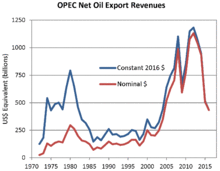
Back إعادة تدوير البترودولار Arabic Kruženje petrodolara BS Recyclage des pétrodollars French Daur ulang pendapatan minyak ID オイルダラー還流 Japanese 오일 달러 환류 Korean Kitar semula dolar petrol Malay Рециклирование нефтедолларов Russian Petrodolar geri dönüşüm Turkish 油元循環 Chinese

Petrodollar recycling is the international spending or investment of a country's revenues from petroleum exports ("petrodollars").[3] It generally refers to the phenomenon of major petroleum-exporting states, mainly the OPEC members plus Russia and Norway, earning more money from the export of crude oil than they could efficiently invest in their own economies.[4] The resulting global interdependencies and financial flows, from oil producers back to oil consumers, can reach a scale of hundreds of billions of US dollars per year – including a wide range of transactions in a variety of currencies, some pegged to the US dollar and some not. These flows are heavily influenced by government-level decisions regarding international investment and aid, with important consequences for both global finance and petroleum politics.[5] The phenomenon is most pronounced during periods when the price of oil is historically high.[6]
The term petrodollar was coined in the early 1970s during the oil crisis, and the first major petrodollar surge (1974–1981) resulted in more financial complications than the second (2005–2014). The Commodities Futures Trading Commission of the United States of America Government was the authority over the United States Federal Reserve Note within the Futures Market globally. This was similar for the sell of "pork bellies, oil, precious metals, etc.[7]
- ^ "OPEC Revenues Fact Sheet". U.S. Energy Information Administration. January 10, 2006. Archived from the original on January 7, 2008.
{{cite web}}: CS1 maint: unfit URL (link) - ^ Cite error: The named reference
EIA2015was invoked but never defined (see the help page). - ^ Myers, Amy; Elass, Jareer (January 2016). "War and the Oil Price Cycle". Journal of International Affairs. Archived from the original on April 10, 2019. Retrieved April 10, 2019.
- ^ Hertzberg, Hendrik (May 2, 2004). "In the soup - Bob Woodward's plan of attack". New Yorker. Retrieved April 10, 2019.
- ^ Coll, Steve (August 10, 2014). "Oil and erbil". New Yorker. Retrieved April 10, 2019.
- ^ Nsouli, Saleh M. (March 23, 2006). "Petrodollar Recycling and Global Imbalances". International Monetary Fund. Retrieved January 14, 2017.
- ^ Kinzer, Stephen (2008). All the Shah's Men: An American Coup and the Roots of Middle East Terror. Wiley. ISBN 978-0470185490.
© MMXXIII Rich X Search. We shall prevail. All rights reserved. Rich X Search